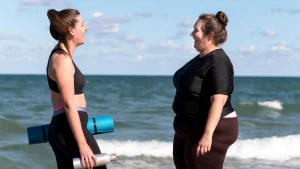Countless people have tried diet after diet and exercise program after exercise program, only to watch the scale creep back up. If you’re considering medical weight loss options, you’re probably wondering whether you should still exercise while taking medications like GLP-1 therapies. The short answer? Absolutely.
Medical weight loss programs use GLP-1 medications such as tirzepatide to regulate appetite and slow how quickly your stomach empties. You feel full longer and experience fewer cravings. Add exercise to the mix, and you create ideal conditions for weight loss that actually sticks.
GLP-1 medications work by copying hormones your body already makes to signal when you’re full and keep blood sugar steady. Exercise brings its own metabolic advantages. Together, they tackle weight loss from multiple angles.
How Exercise Supports Medical Weight Loss
Exercise does more than burn calories when you’re using medical weight loss treatments. It protects your muscle mass while you’re losing weight, which keeps your metabolism humming. Skip the exercise, and you risk losing muscle along with fat. That slows your metabolism and makes maintaining weight loss much harder down the road.
Physical activity makes your body more sensitive to insulin, which can boost how well GLP-1 medications work. When your body handles insulin better, it processes sugar more efficiently and stores less as fat. Your medication and workouts start reinforcing each other. Some people also struggle with hormonal issues that complicate weight loss, which is where treatments like bioidentical hormone therapy for women or for men combined with exercise can address multiple factors at once.
Working out releases feel-good chemicals called endorphins and helps manage stress. Both matter when you’re adjusting to new eating habits and dealing with the mental side of losing weight. Many people notice their mood and motivation improve when they stay active during treatment.
Research shows people who exercise while using medical weight loss medications keep their results longer than those who rely only on medication. The exercise habits you build while losing weight become the foundation for keeping it off permanently.
The Right Exercise Approach for Medical Weight Loss
Your exercise choices matter when you’re taking weight loss medications. GLP-1 drugs can significantly reduce your appetite, which might leave you with less energy for intense workouts at first. Start with moderate activities and ramp up slowly as your body adjusts to both the medication and increased activity.
Make strength training a priority. Lifting weights or doing resistance exercises helps preserve muscle while you’re eating fewer calories. This keeps your metabolism higher and improves how your body looks as pounds come off. Stick with exercises that work several muscle groups at once – squats, deadlifts and pushups give you the biggest bang for your buck.
Low-impact cardio like walking, swimming or bike riding works well for most people starting out. These activities torch calories without beating up your joints, especially important if you’re carrying extra weight. A 30-minute daily walk burns 150 to 200 calories while being easy on your body during early weight loss.
Once you get lighter and stronger, you can tackle more challenging activities. High-intensity interval training, dance classes or hiking become realistic options as your fitness improves.
Timing Your Exercise with Medical Weight Loss
Your appetite and energy might swing up and down as your body gets used to the medication. Some people feel queasy or tired during the first few weeks. During this adjustment phase, stick with gentle movement like walking or light stretching instead of pushing through intense workouts.
Pay attention to how you feel and work with your doctor to figure out the best workout schedule. Some people do better exercising before taking their medication to avoid stomach upset. Others prefer working out later in the day after eating something and stabilizing their energy.
When you exercise can affect how well you handle your medication. Morning workouts often work because energy levels are usually higher early in the day. But if the medication makes you tired, afternoon or evening sessions might suit you better.
If you take weekly GLP-1 shots, think about your injection schedule. Some people skip intense workouts on shot days to avoid side effects, while others notice no difference in how they feel during exercise regardless of timing.
Nutrition Considerations for Exercise and Medical Weight Loss
When medications reduce your appetite, getting enough nutrition to fuel workouts becomes tricky. Focus on foods packed with vitamins, minerals and protein rather than empty calories. Your body needs quality fuel for recovery and maintaining muscle.
Protein becomes especially important when you’re exercising and losing weight. Getting enough protein helps preserve muscle and aids recovery while keeping you satisfied longer. Smaller, more frequent meals often work better for maintaining energy while dealing with a smaller appetite. Shoot for 20 to 30 grams of protein at each meal to support your workouts and muscle health.
Planning what to eat before and after workouts requires more thought when your appetite is suppressed. A small snack with both carbs and protein 30 to 60 minutes before exercise can provide fuel without overwhelming your stomach. After working out, focus on protein for muscle recovery plus some carbs to replace what you burned.
Don’t forget about water. Some GLP-1 medications can cause mild dehydration, and exercise increases how much fluid you need. Staying hydrated helps both your medication work better and your exercise performance. A quick check: your urine should be pale yellow.
Long-Term Success with Combined Approaches
Pairing medical weight loss with exercise builds habits that outlast your medication treatment. GLP-1 medications provide powerful appetite control, but developing a consistent workout routine creates the framework for keeping weight off long-term. You’re tackling both losing the weight and the challenge of maintenance.
People who exercise during their medical weight loss program consistently report feeling stronger, having more energy and feeling better about themselves. They also do a better job maintaining their weight loss after finishing their medication. The physical improvements from exercise – like increased strength and endurance – provide concrete benefits that motivate people to stick with healthy habits.
Exercise helps you build a positive connection with being active that can last for decades. This mindset shift, backed up by the initial success from medical weight loss, creates a powerful combination for permanent results. Many people find activities they genuinely enjoy during their weight loss journey and keep doing them long after hitting their goal weight.
The health benefits of combining exercise with medical weight loss go beyond the number on the scale. Better heart health, improved blood sugar control and stronger bones are bonuses that contribute to long-term wellbeing and quality of life.
Take the Next Step with Sota Wellness
Sota Wellness in Sarasota recognizes that successful weight loss looks different for everyone. We create comprehensive plans that combine medical weight loss with appropriate exercise and lifestyle changes based on your specific situation and needs.
Erin Britton, RN, FNP-C, has guided numerous patients to lasting weight loss success through individualized treatment plans. We’ll work with you to find the right mix of medical treatments and lifestyle changes for your goals. Our approach takes into account your current fitness level, any health conditions and what you actually enjoy doing to create a plan you can stick with.
Ready to start your weight loss journey? Book an Appointment today to discover how medical weight loss and exercise can work together for your success.
Frequently Asked Questions
Can I start exercising immediately when beginning GLP-1 medications?
You can generally begin light exercise immediately, but it’s best to start slowly and gradually increase intensity. Some patients experience mild side effects during the first few weeks that may affect their energy levels. Walking and gentle stretching are usually well-tolerated from the start.
Will exercise reduce the effectiveness of my medical weight loss medication?
No, exercise actually supports and may improve the effectiveness of GLP-1 medications. Physical activity improves insulin sensitivity and helps preserve muscle mass, both of which complement the appetite-suppressing effects of the medication.
What type of exercise is best during medical weight loss?
A combination of strength training and moderate cardiovascular exercise works best. Strength training helps preserve muscle mass during weight loss, while cardio burns calories and improves heart health. Start with activities you enjoy and can maintain consistently.
How do I manage reduced appetite and exercise energy needs?
Focus on nutrient-dense foods and prioritize protein to fuel your workouts. Eat smaller, more frequent meals and time your food intake around your exercise schedule. Work with your health care provider to adjust your approach if you’re struggling with energy levels.
Should I modify my exercise routine as I lose weight?
Yes, you may need to adjust your routine as you lose weight and become fitter. Your capacity for exercise will likely improve, allowing you to increase intensity or try new activities. Regular reassessment with your health care provider can help optimize your exercise plan throughout your weight loss journey.






